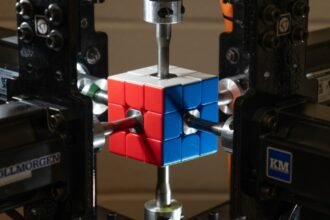The escalating size and complexity of language models have led to an increased demand for resources to train and deploy them. While extensive models deliver impressive results across various benchmarks, they remain out of reach for many organizations due to infrastructure constraints and hefty operational expenses. This disparity between capability and deployability poses a practical challenge, especially for enterprises aiming to incorporate language models into real-time systems or cost-sensitive environments.
In response, small language models (SLMs) have gained attention as a feasible solution, reducing memory and computing demands without heavily sacrificing performance. Nonetheless, many SLMs struggle with delivering reliable outcomes across diverse tasks, often facing trade-offs that hinder generalization or usability.
ServiceNow AI Launches Apriel-5B: Advancing Practical AI at Scale
In light of these challenges, ServiceNow AI has introduced Apriel-5B, a new series of small language models emphasizing inference speed, training efficiency, and cross-domain versatility. Boasting 4.8 billion parameters, Apriel-5B is compact enough for deployment on modest hardware while maintaining competitive performance across various instruction-following and reasoning tasks.
The Apriel series offers two variants:
- Apriel-5B-Base, a pretrained model designed for further tuning or integration in pipelines.
- Apriel-5B-Instruct, an instruction-tuned version optimized for chat, reasoning, and task completion.
Both models are available under the MIT license, facilitating open experimentation and wider adoption across research and commercial fields.
Architectural Design and Technical Highlights
Apriel-5B was trained on a dataset of over 4.5 trillion tokens, meticulously compiled to encompass multiple task categories, including natural language understanding, reasoning, and multilingual capabilities. The model incorporates a dense architecture optimized for inference efficiency, featuring key technical elements such as:
- Rotary positional embeddings (RoPE) with an 8,192-token context window, supporting long-sequence tasks.
- FlashAttention-2, providing faster attention computation and superior memory utilization.
- Grouped-query attention (GQA), diminishing memory overhead during autoregressive decoding.
- Training in BFloat16, ensuring compatibility with modern accelerators while maintaining numerical stability.
These architectural choices empower Apriel-5B to retain responsiveness and speed without the need for specialized hardware or extensive parallelization. The instruction-tuned version was fine-tuned using curated datasets and supervised techniques, enabling proficiency in various instruction-following tasks with minimal prompting.
Evaluation Insights and Benchmark Comparisons
Apriel-5B-Instruct has been assessed alongside several well-known open models, such as Meta’s LLaMA 3.1–8B, Allen AI’s OLMo-2–7B, and Mistral-Nemo-12B. Despite its smaller size, Apriel delivers competitive performance across numerous benchmarks:
- Outperforms both OLMo-2–7B-Instruct and Mistral-Nemo-12B-Instruct on average across general-purpose tasks.
- Exceeds the performance of LLaMA-3.1–8B-Instruct on math-focused tasks and IF Eval, which measures instruction-following consistency.
- Requires considerably fewer computing resources—2.3x fewer GPU hours—compared to OLMo-2–7B, highlighting its training efficiency.
These results indicate that Apriel-5B strikes a balance between lightweight deployment and task versatility, especially in domains where real-time performance and limited resources are crucial.
Conclusion: A Practical Addition to the Model Ecosystem
Apriel-5B embodies a balanced approach to small model design, prioritizing inference speed, training efficiency, and essential instruction-following capabilities over sheer scale. ServiceNow AI has crafted a model series that is straightforward to deploy, adaptable to varied applications, and openly accessible for integration.
With its strong results in math and reasoning benchmarks, coupled with a permissive license and efficient compute profile, Apriel-5B presents a compelling option for teams incorporating AI into products, agents, or workflows. In a domain increasingly defined by accessibility and practical applicability, Apriel-5B represents a pragmatic advancement.</p









